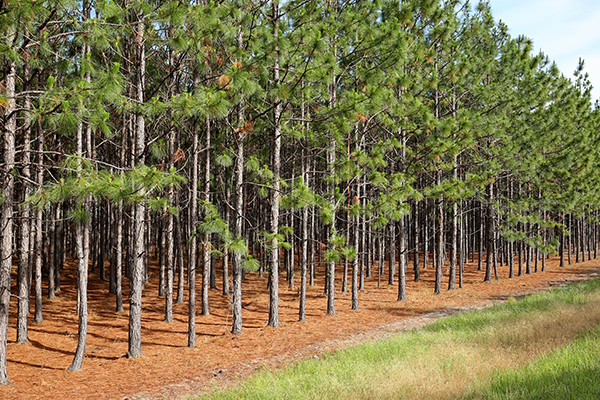An Auburn University research team has published the first study to define, outline and apply novel climate-smart forestry, or CSF, principles to North America, specifically the Southern United States.
Climate-smart forestry is defined in the study as the relationship between economic goals and ecosystem services recognized by experts from the private timber industry, non-governmental organizations and private forest landowners. The study, recently published in the journal Forests, sought to define CSF within the southeast and exhibit how loblolly pine management, forest products and data integrity can all work harmoniously to battle climate change by supporting increased forest carbon storage, a major CSF objective.
Trees draw carbon dioxide from the atmosphere through photosynthesis, which supports tree function and growth. The entire tree stores carbon, including the trunks, branches, leaves and roots. When harvested, a tree continues to store carbon in the form of wood products.
“In short, the takeaway is how the lifecycle of lumber, a typical forest product, from the initial steps of tree planting to lumber manufacturing to final house construction, all help mitigate climate change by increasing carbon storage. All of this is initiated by operational silvicultural activities that support timber stand production and health,” said Noah Shephard, a research associate in Auburn’s College of Forestry, Wildlife and Environment and lead author of the study.
Shephard worked with co-authors in the college, Lana Narine, an assistant professor of geospatial analytics, Yucheng Peng, an assistant professor of sustainable packaging and bioproducts, and Adam Maggard, an associate professor of forest systems management.
The team found that active forest management has a special role within CSF, and there is great potential for fast-growing loblolly pine rotations to alleviate climate-change effects, such as rising atmospheric carbon dioxide, through transferring such atmospheric carbon to biomass carbon.
“Significantly, Southern private forests account for almost 60 percent of nationwide net above-ground biomass flux, a flux approximately 2.5 times greater than Northern private forests and 10 times greater than Western private forests,” said Shepard.
The study shows that to mitigate climate change effectively, forest products are key to increasing carbon sequestration beyond the current baseline. Fortunately, traditional forest plantation practices are already working toward this goal.
“Everyday forestry practices like genetic improvement, planting, weed control, stand density management, nutrient improvement and harvest can all lead to climate change mitigation. All of this must be supported by timber products, a strong timber product market and incentives for active land management with timber harvesting,” said Shephard.
As the popularity of CSF implementation grows in the United States, it is increasingly important for landowners to be aware of these practices and how they can contribute to climate change mitigation. Using nature-based solutions like CSF, foresters, landowners and land managers can leverage naturally occurring ecosystem services, such as the carbon cycle, to increase climate change mitigation.
“This research serves as the first major building block to CSF in North America,” Shephard said. “From a comprehension perspective, our hope is that our review will jump-start the Climate Smart Forestry movement for forest landowners, forest researchers and the forest industry. With our review, we hope others will advance realistic CSF applications for southern landowners, especially within Alabama. This will not only help Alabama landowners in terms of changing conditions, but set the state as the leading example in the U.S. for pragmatic land management.”
This study was made possible by the funding and expertise provided by Resource Management Services, or RMS, Forest Investment Associates, or FIA, and The Westervelt Company.
“Given the economic and societal importance of forests within the Southeast, the research and efforts being made by Shephard and his team to examine the potential influences of climate-smart forestry initiatives are significant,” said Janaki Alavalapati, dean of the College of Forestry, Wildlife and Environment. “We anticipate many positive results for Alabama’s landowners from this impactful work.”
(Written by Avanelle Elmore)



![Loblolly pine plantation aboveground carbon accumulation rates with common operational silviculture, i.e., chemical prep and plant = chem. prep. and plant only; fertilization = chem. prep. and plant + herbaceous weed control (HWC) + thinning + fertilization. Number by treatment = average yield till harvest. Dashed circle = baseline. Arc terminus = rotation age. Data from Oneil [56], where harvest was determined at 6% return-on-investment, and the data represent Southern averages, not an existent stand.](https://cfwe.auburn.edu/wp-content/uploads/2023/01/52648287652_f0c5e936aa_o.jpg)
![Carbon pools in forest stand, forest products and under forest product substitution. From Maggard et al. [85]. Originally developed for sustainable forest management in the Pacific Northwest by Perez-Garcia et al. [86] and Lippke et al. [87].](https://cfwe.auburn.edu/wp-content/uploads/2023/01/52648784956_84a642df0e_o.png)
![Biogenic carbon (temporary storage) for Southern-sourced wood products from raw material extraction through product installation. OSB = oriented strand board; LVL = laminated veneer lumber; Glulam = glue laminated lumber. Data from CORRIM Library of LCAs on Wood Products (https://corrim.org/lcas-on-wood-products-library (accessed on 19 July 2022) [100]).](https://cfwe.auburn.edu/wp-content/uploads/2023/01/52649054579_74a8222c39_o.jpg)








